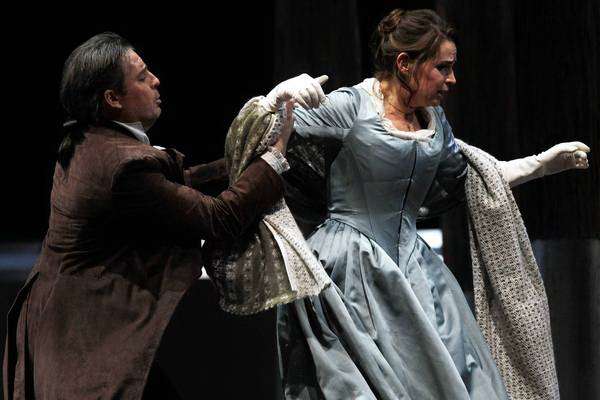|
Back
From Fluff to Standard Repertoire Chicago
Lyric Opera
11/11/2012 - & November 14, 17, 20*, 23, 26, 2012
Jules Massenet: Werther
Mathew Polenzani (Werther), Sophie Koch (Charlotte), Will Liverman (Brühlmann), Cecilia Hall (Käthchen), Craig Verm (Albert), Philip Kraus (The Bailiff), Tess Dinerstein (Gretel), Hunry Lunn (Hans), Shannon Corey (Clara), Daniel Coonley (Karl), William Anderson (Fritz), Jacob Simon (Max), David Govertsen (Johann), John Irvin (Schmidt), Kiri Deonarine (Sophie)
Lyric Opera of Chicago Orchestra and Chorus, Sir Andrew Davis (conductor)
Francisco Negrin (director), Louis Désiré (set and costume designer), Duane Schuler (lighting designer)

M. Polenzani & S. Koch (© Lyric of Chicago)
It is easy to dismiss Massenet. Even his contemporaries reduced him to “Mademoiselle Wagner,” a derisive comparison with the great German composer which implied that Massenet’s works were merely derivative of the greater operas from across the Rhine. Massenet did not help his own case, or the case of his opera Werther, when he announced that hearing Wagner at the Bayreuth Festival of 1886 made him want to rush home to burn his opera’s as yet unperformed score.
Nevertheless, neither the composer nor his opera – an adaptation of Johann Wolfgang von Goethe’s novella of hopeless love and desperate suicide – ever fully fell from the repertoire. A production as excellent as Lyric Opera of Chicago’s may even elevate it from an occasional curiosity to a solid standard repertoire piece. In the hands of the cosmopolitan director Francisco Negrin, who has successfully staged Handel operas for Lyric in addition to prodigious work elsewhere, it is hard to image a more penetrating and effecting production. Louis Désiré’s sets and costumes fall into that category of “edgy traditional” that seems to be pushing out the bizarre and overtly provocative. This Werther preserves the original setting of the opera – Germany in the 1780s – with the expected but stylish costumes. The unchanging set is a two-plane platform. The dark bottom half is dominated by Werther’s humble quarters – a simple bed surrounded by piles of books. The upper part serves as the bourgeois home made by the Bailiff for his family and then later by Werther’s lost love Charlotte and her boring but reliable husband Albert. At stage right, a rising pile of crates and belongings suggest a new household with people moving in. Projections of houses and trees against a back screen reflect an understanding of domesticity and its questionable relationship with nature. Occasionally, a searing red bar of light reminds us of inner passion constrained. Negrin’s personal direction allowed the cast’s dramatic talents to overcome or at least radiate through their inhibitions. The only questionable effect came at the end, when Werther’s suicide is accompanied by three blindfolded, on-stage doubles carrying torches. This rather obvious image distracted from the effect’s major advantage – one of the doubles falls dead on stage after Werther shoots himself, allowing the singer to remain upright, perhaps as a ghost, to avoid the awkwardness of having to sing passionately despite a fatal self-inflicted wound.
Werther of course rises and falls on its lovers, and Lyric casted these roles with exceptional taste. In the title part Mathew Polenzani continued his brilliant rise from a Metropolitan Opera comprimario singer to major stardom. There may have been a bit too much head voice for everyone’s taste, but a fine lyrical sensibility delivered opera’s first doomed romantic with verve and aplomb. French mezzo Sophie Koch, who has attracted excellent notices in her Wagnerian singing in Paris, made her American debut in this production. Her Charlotte resounded with an ineffable beauty, lustrously rounded tones, and an effortless ease of scale that raised the performance to Golden Age heights. Craig Verm sang the unheralded role of Albert with a skilled baritonal depth, though the dull part leaves few avenues to make a major impression. Sir Andrew Davis led a skilled performance from the Lyric’s orchestra that should rightly share the glory of his excellent principals.
ConcertoNet is on Facebook
Twitter: @concertonet
Paul du Quenoy
|